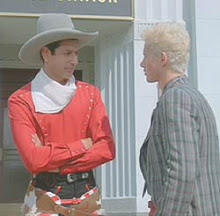Produced by Jay-Z & Kareem "Biggs" Burke; written by Shawn Carter, N.Landsberg, Felix Pappalardi, Rick Rubin, Billy Squier, J. Ventura, & L. Weinstein
Def Jam 000248411 2004 Billboard: # 30
Just after this single came out, a friend of mine was scheduled to speak at a conference on Black Masculinity in the Twenty-First Century. I suggested he and the other participants spend the conference taking apart this song.
Let me roll things back a bit to put this in perspective. In 1931, Louis Armstrong recorded "Shine," a song that lists nearly all of the qualities that are supposed to identify the stock Negro of early twentieth century culture
 . No one would deny that the song itself is deeply racist, a late survival of the worst minstrel show tendencies. The argument comes over what to make of Armstrong's interpretation of the song. Some--especially those who have seen the 1932 film A Rhapsody in Black and Blue, in which Armstrong performs the song in a leopard skin--would argue that his recording perpetuates the worst traits of racism, that one of jazz's great revolutionaries had by 1931 become no more than an Uncle Tom, allowing himself to be seen exactly as racist whites wanted to see him. For me, though, Dooley Wilson's version of the song in Casablanca is much more stereotypical. Wilson may be wearing a suit rather than a leopard skin as he sings it, but his eyes roll all the while, he hangs on the audience's reaction, and his vocal attack on the lyrics wouldn't have been out of character for such turn of the century minstrel legends as Arthur Collins or Byron Harlan.
. No one would deny that the song itself is deeply racist, a late survival of the worst minstrel show tendencies. The argument comes over what to make of Armstrong's interpretation of the song. Some--especially those who have seen the 1932 film A Rhapsody in Black and Blue, in which Armstrong performs the song in a leopard skin--would argue that his recording perpetuates the worst traits of racism, that one of jazz's great revolutionaries had by 1931 become no more than an Uncle Tom, allowing himself to be seen exactly as racist whites wanted to see him. For me, though, Dooley Wilson's version of the song in Casablanca is much more stereotypical. Wilson may be wearing a suit rather than a leopard skin as he sings it, but his eyes roll all the while, he hangs on the audience's reaction, and his vocal attack on the lyrics wouldn't have been out of character for such turn of the century minstrel legends as Arthur Collins or Byron Harlan.By contrast, if you open your ears, what Armstrong does with the song is much more radical. He does more than simply "scat" the lyrics--he deconstructs them into smithereens. His vocal and improvisatory skill is so manifest, and the sounds are so chopped up into fragments, that the lyrics almost don't seem to exist anymore. He doesn't inhabit a racist song and allow it to endure. He stomps it into submission until we'll never be able to take the "real" words seriously again.
Jay-Z's performance on "99 Problems" is much the same trick, but it's more a matter of semantics than phonics. He takes one word that he, like many 1990s rappers, has rightfully been accused of overusing and rings a series of changes on it. The word, of course, is bitch, and if you don't think HOVA ever used it too casually, listen to 1998's "Can I Get a ---?" again (even though that track does technically give women equal time to complain about their worthless men).

Here, though, that noxious word gives rise to a masterpiece of the genre. Listening to Jay-Z on this record, from his supposed "farewell" album, I think he's not only read the complaints about his language, he's read the conference papers and dissertations about him too. He turns the word on its head, implicitly acknowledging that the concerns that dominate most rap lyrics are relatively trivial. The icing on the cake, of course, is when he takes a verse to brilliantly relate a far-too-typical DWB pullover and ends the cop's spiel with the line We'll just see how you feel when the canines come, taking bitch back in the ensuing chorus to its literal meaning. The drop to the downbeat between that verse and chorus may be my favorite hiphop moment ever.




